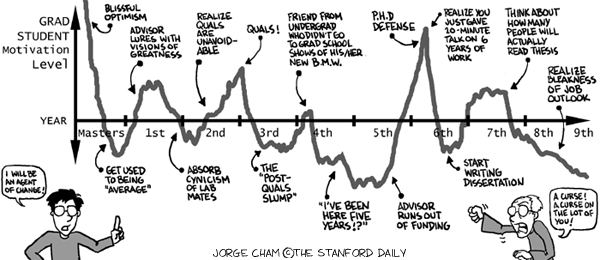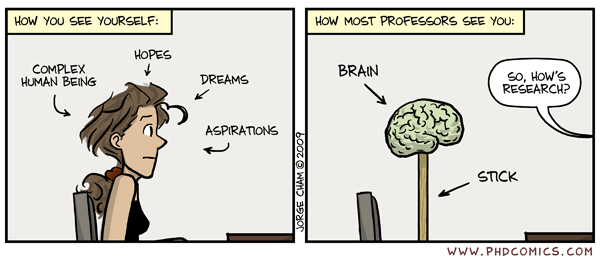During the PhD, we are faced with a differing amount of stress and the motivation varies throughout your PhD. It is very probable that you will experience multiple ups and downs, and that’s completely normal!

However, whilst some level of stress is acceptable, distress and anxiety due to stressful situations are not. Stress due to bad relations with your supervisor or colleagues, a lack of respect, or an unrealistic workload, have to be avoided.
You have rights, and respect and tolerance are the basis of a good working environment. And there are people to assist you in finding solutions regarding your well-being.
- You feel uncertain about what your supervisor expects from you, about how you are handling your research, and don’t really know how to communicate your doubts: talk to your peers (other PhD students in your lab or program, and postdocs), as they have most probably already experienced similar situations and can offer advice and guidance.
- It is always important to voice your doubts and be able to have a calm and structured discussion with your thesis director or other supervisor that you may have, which should arise every year when filing the Annual report. However, you can always ask for more frequent meetings and should ask for feedback. Generally, it is quite normal to meet your supervisor at least once per month. You should have a clear idea of how your supervisor thinks your project is progressing. Your thesis director is your first contact person regarding all issues concerning your thesis and other EPFL related work. S/he should also ensure a good working environment in the lab, and address and manage conflicts between members of the lab. If you have difficulties with your thesis, or with some of your colleagues, contacting your thesis director should be your first step.

-
When you enroll in the doctoral program, depending on your program, you will be assigned a mentor or you may choose a mentor from a pool of mentors. The mentor is a professor or MER who can offer you advice on your career and guidance more generally. They also act as a first point of contact for advice in case of problems with your supervisor or the laboratory. The mentor is anonymous and your meetings are confidential. They will make suggestions on how to solve possible issues and explain your options. You will meet your mentor according to your needs, but at least once a year at the time of the candidacy exam or the annual report.
- The administrative staff in your doctoral program can usually offer very good advice in case of administrative or procedure problems but can also orient you to the right interlocutor, as they are aware of the structure in place at EPFL.
- If you need an external point of view in the case of communication issues with your supervisor or your research group and have already contacted your mentor, the doctoral program director knows your rights as a PhD student and should be able to help solve possible issues.
- In the case where the program director is your thesis director, or if for some other reason you are uncomfortable to discuss with the program director, or in urgent situations, you can contact the EDOC staff directly ([email protected]). EDOC is the Doctoral School, which oversees all the doctoral programs. They will offer support and intervention in a confidential manner.
- Support is available on campus. The Student Affairs (SAE) has a team of professionals who provides individual support and counselling to PhD students for matters related to stress, social, integration, adaptation to your new context, disability and special needs arrangements, etc. This support is free of charge. To make an appointment, please contact the Student services desk in person, by phone or by email ([email protected]).
- If you wish to have temporary medical support or advice, the psychiatric and psychotherapeutic consultation on EPFL campus is here for you. To request an appointment please send an email at [email protected]. The first consultation is free of charge, paid by EPFL.
- If you are uncomfortable with contacting your mentor, or any member of your doctoral program you can contact the Person of Trust, who is a legal expert specialized in workplace issues (work-related stress and anxiety, conflict management, harassment, unethical behavior…) and who is outside of the EPFL hierarchy: she/he doesn’t have any connection with your lab or other academic environments. She/he will work in strict confidence and anonymity, being submitted to professional confidentiality. For PhD students, the Person of Trust can be contacted by email ([email protected]).
If you are observing unethical or illegal behavior, you can either report a case to an interlocutor internal to EPFL, the respect unit, or external to EPFL, the ombudsperson. Both will take action as quickly as possible:
- The respect unit is a body that evaluates formal complaints relating to psychological and sexual harassment at EPFL. Psychological harassment or mobbing and sexual harassment have been clearly defined in order to help identify potential cases. The respect unit examines the need for a formal investigation and makes recommendations for action. You can contact the respect unit to report a case, complain or even ask for advice concerning a case ([email protected]). Please also note that there is a support network who provides targeted support at all times, and as needed.
- The ombudsperson is an independent authority external to EPFL. Her task is to examine reports of breaches of conduct by EPFL members submitted to it and to examine, from a legal point of view, their admissibility. If the alleged facts justify an investigation, the ombudsperson will then forward the file to the EPFL Direction. Information about the procedure and the person reporting a situation will be kept confidential as far as possible. However, confidentiality will be waived in cases where disclosure of information is mandatory under legal or regulatory provisions, judicial procedures, or in order to protect the overriding interests of EPFL or the public. The identity of the person reporting a situation will be disclosed to the persons in charge of the procedure. The ombudsperson for EPFL is Isabelle Salomé Daïna, Salomé Preile Associées https://salomepreile.ch/.
If you are being harassed, talk about it as soon as possible and ask for help. Silence does not solve anything. In fact, it can have a negative effect on self-esteem. It also allows the purported harassers to continue with impunity. You will find additional details about the help you can get at EPFL and the steps that you should take to put an end to this situation on this webpage.
If you’ve read all of the above, but still don’t know who to contact for a particular issue, you can ask the PhD representative of your doctoral program or the doctoral school ([email protected]), who will direct you to the best interlocutor.
For additional information, you will find all the rules, practices and values governing the EPFL in the compliance guide.
Mental Health Crises
If you or someone you know is experiencing a mental health crisis that needs immediate intervention, including suicidal thoughts, there are several resources providing anonymous and confidential support:
- La Main Tendue is a 24 hour anonymous mental health helpline providing support in French, German and Italian. They can be reached directly by dialing 143 from any Swiss phone.
- For telephone support in English, Samaritans is a UK-based crisis line that can be reached by dialing +44 8457 90 90 90. The Suicide Prevention Lifeline is an American crisis line that can be reached by dialing +1-800-273-8255. This number is free to call using Skype.
- The Stop Suicide association is an organization working to prevent suicide among youth. Their website has many resources which may be helpful.